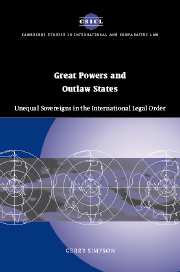Book contents
- Frontmatter
- Contents
- Foreword
- Preface
- Acknowledgements
- List of abbreviations
- Part I Introduction
- Part II Concepts
- Part III Histories: Great Powers
- Part IV Histories: Outlaw States
- Part V Conclusion
- 11 Arguing about Afghanistan: Great Powers and outlaw states redux
- 12 The puzzle of sovereignty
- Select bibliography
- Index
11 - Arguing about Afghanistan: Great Powers and outlaw states redux
Published online by Cambridge University Press: 05 July 2009
- Frontmatter
- Contents
- Foreword
- Preface
- Acknowledgements
- List of abbreviations
- Part I Introduction
- Part II Concepts
- Part III Histories: Great Powers
- Part IV Histories: Outlaw States
- Part V Conclusion
- 11 Arguing about Afghanistan: Great Powers and outlaw states redux
- 12 The puzzle of sovereignty
- Select bibliography
- Index
Summary
“[P]osses” of such allies should be coalesced according to the requirements of specific situations rather than necessarily through existing international institutions.
Every nation has a choice to make … If any government sponsors the outlaws and killers of innocents, they have become outlaws and murderers, themselves.
Every political regime has its foes or in due course creates them.
Introduction: juridical sovereignty and the war in Afghanistan
This book has been about the ways in which the sovereign equality of states has been qualified by the existence of legalised hegemony and anti-pluralism. I have characterised this combination of sovereign equality and these two legalised hierarchies as juridical sovereignty. As I concluded the writing of the main body of the text in early 2002, the United States and its allies were engaged in military action in Afghanistan against the remnants of the al-Qa'ida group, having successfully prosecuted a war against the Taliban regime which resulted in that government falling and being replaced by a temporary administration of national reconciliation. In a sense this conflict, though not, of course, its immediate cause, was foreshadowed by the analysis in the preceding pages. After all, this was a war fought by a coalition of Great Powers in the territory of an outlaw state. As a result, the norms and practices of legalised hegemony and anti-pluralism were, again, brought into relief.
- Type
- Chapter
- Information
- Great Powers and Outlaw StatesUnequal Sovereigns in the International Legal Order, pp. 319 - 351Publisher: Cambridge University PressPrint publication year: 2004



